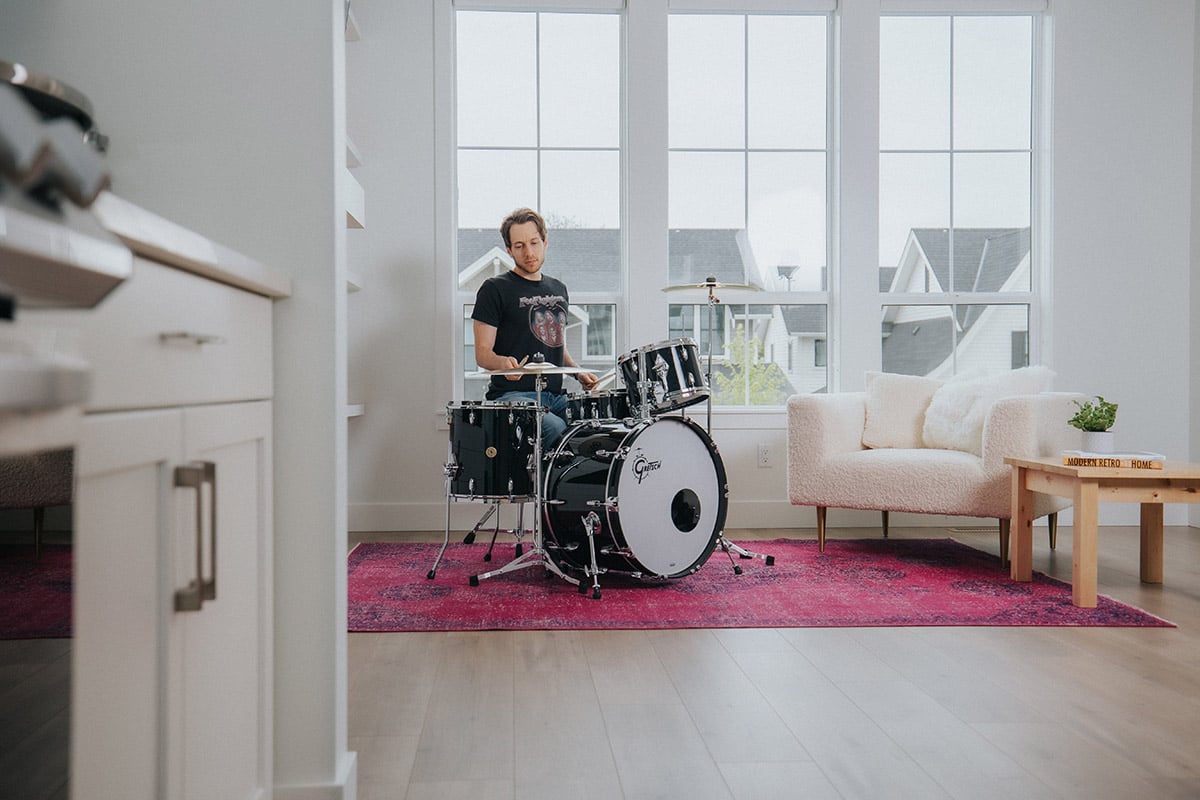
Can you play drums in an apartment quietly enough to not upset your neighbors?
With a big city comes a dense population, and apartment living is the norm. While your drum kit might sit comfortably in a suburban home, your apartment neighbors are far less likely to support your drumming journey.
Drumming can be a struggle when you live in an apartment building. But if you want to keep practicing and improving, you’ll have to make it work somehow.
Thankfully, there are a few things you can do to keep noise levels down.
In all my years of drumming, I’ve lived in a few places where my neighbors were too close for comfort. I didn’t like hearing their kids watching episodes of Peppa Pig on repeat, but I’m sure they loathed my drumming even more.
After trying a few of the following methods, I found a happy medium where they couldn’t hear me playing as clearly, and I even managed to block out most of the sound coming from their side. It was a win-win all around.
Let’s look at a few options for practicing drums in an apartment.
If you’re playing an acoustic drum set, you’ll need to tackle the resonance of the drums first. (In Europe? See acoustic drums here.)
If you’re like me and whack your toms like you’re playing at Wembley Stadium, they’ll be loud and intense if your drums aren’t muffled.
Muffling refers to controlling the tones of your drums by placing things on top or inside of them. The more muffling you apply, the less resonance your drums have.
Drums produce these things called overtones, and they’re often harsh and unpleasant to hear. Getting rid of these with muffling will make your drums sound better to both you and your neighbors.
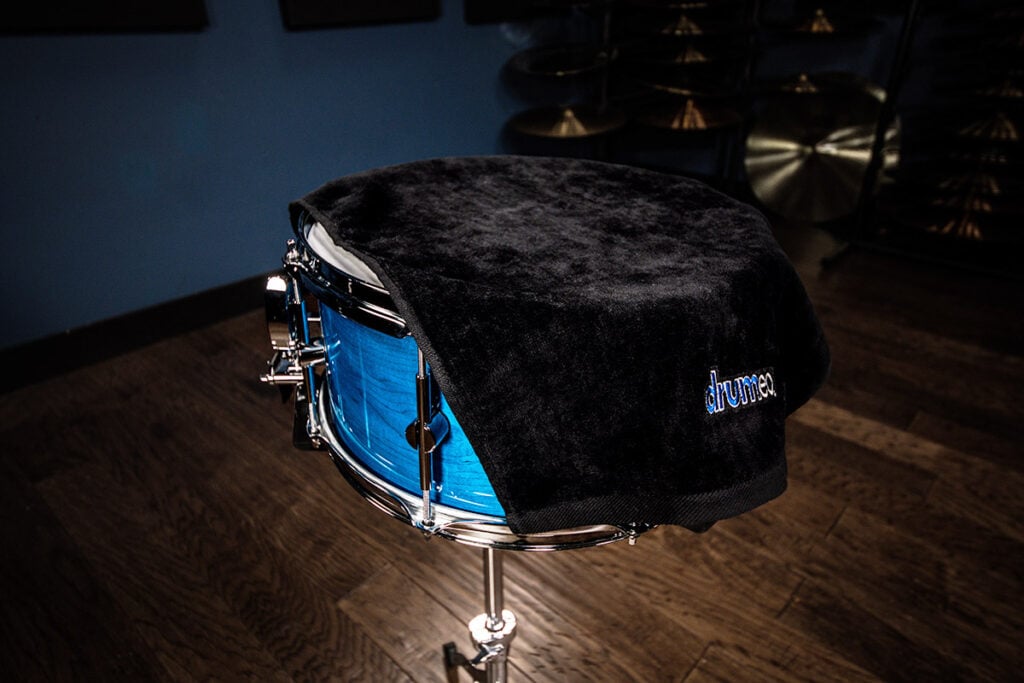
Typically, it’s good to muffle your drums slightly so they maintain their tone. Killing off the resonance completely will give you a flat sound every time you play.
However, flat-sounding drums are exactly what you want in an apartment. The less resonance they have, the better.
Here are a few ways to muffle your drums:
You can go one step further to:
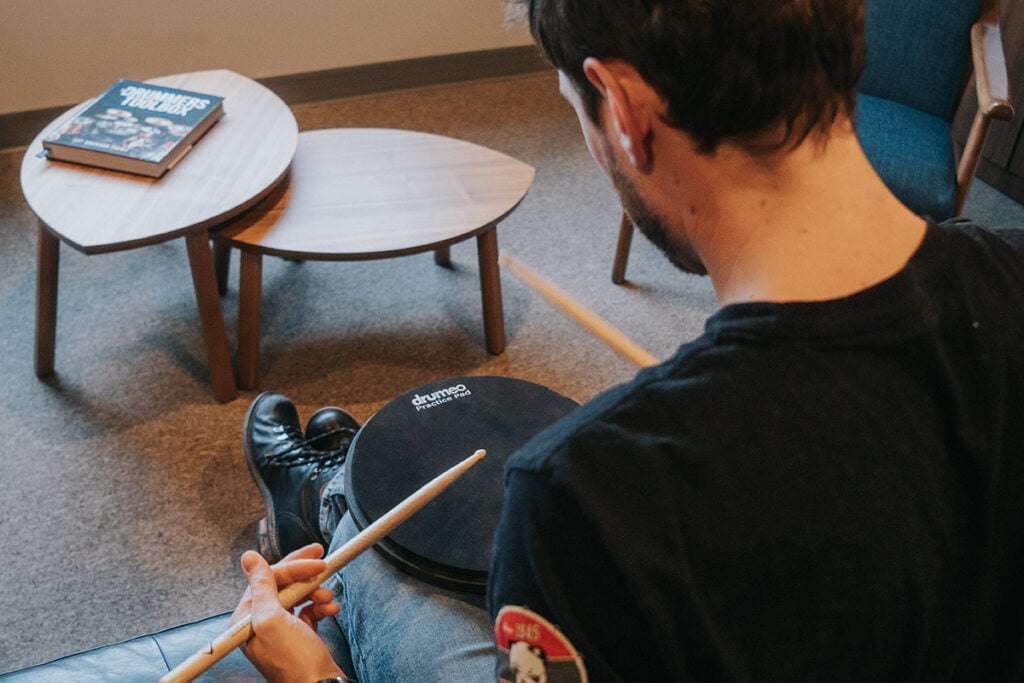
While they may not sound as fun as playing on your actual drum set, practice pads are important in helping you develop your technique and speed. (In Europe? See practice pads here.)
Playing on a pad won’t bother your neighbors*, so it’s ideal for practice at times when loud drumming is a non-negotiable. Practice pads are simple, no-frills tools, which makes it easier to focus on one thing rather than getting distracted by a full set of drums.
(Do you ever zone out mid-session and jam your favorite fills over and over? Me too.)
To get the most out of this practice method, work your hands and bass drum foot simultaneously by setting up a pad on a stand and a pad for your foot. The Drumeo QuietKick is the perfect option here: it’s a small pad for your bass drum pedal that has multiple surface options, with the ultra quiet strike pad an ideal surface for apartment practicing. (In Europe? Shop the QuietKick here.)
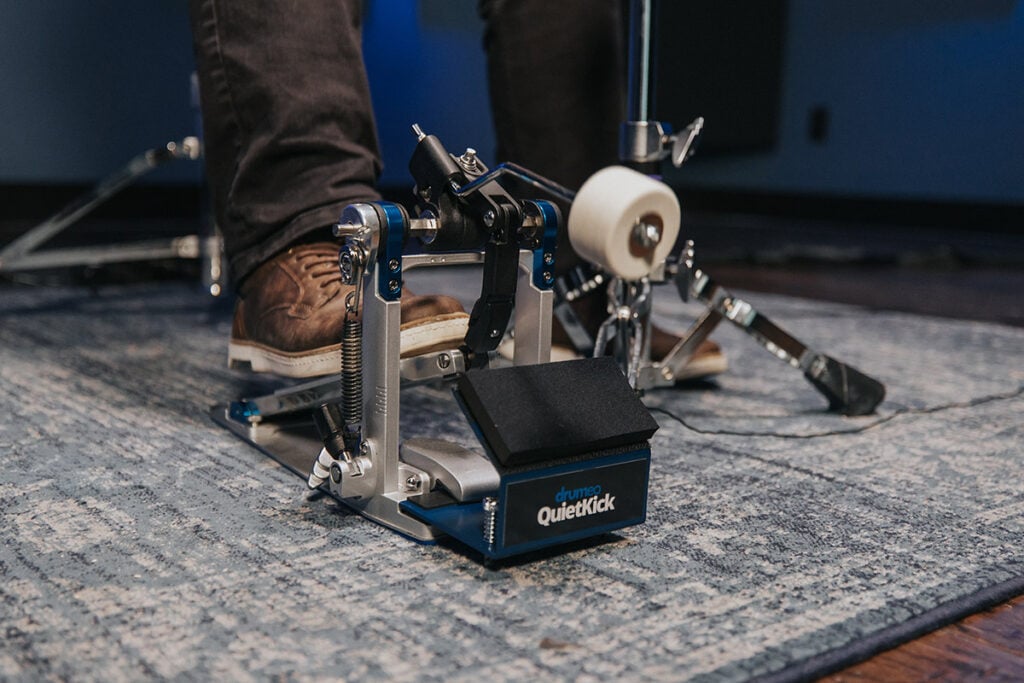
*Note that the kicking sound on a bass drum practice pad can sometimes still be heard through walls and floors, depending on your building’s construction and your location in the apartment. Be cautious of that when working on your pedal technique.
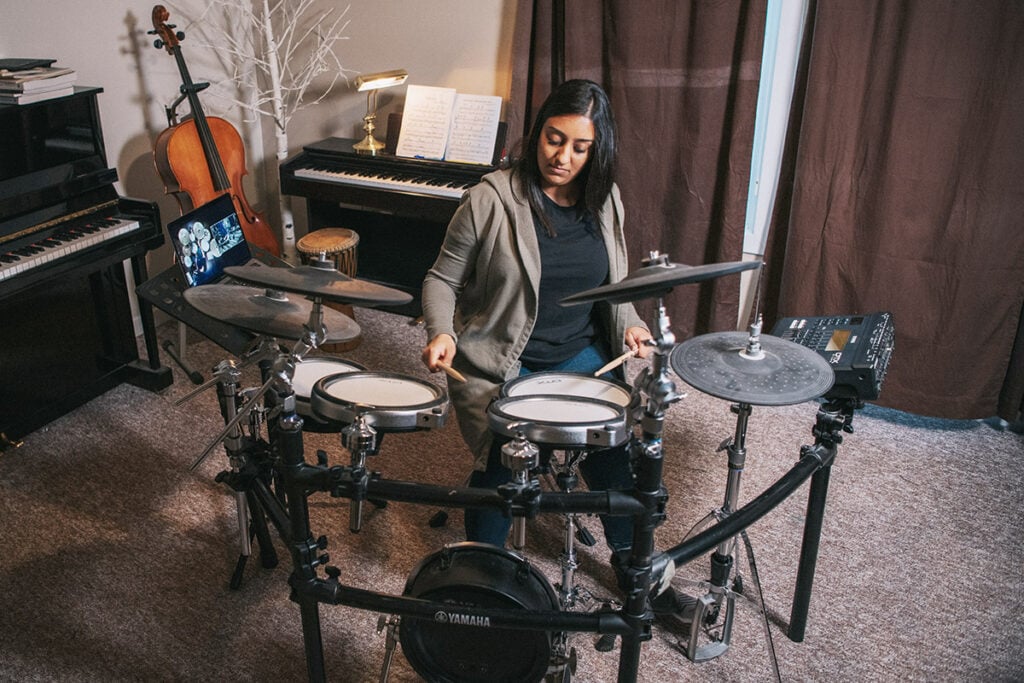
An electronic drum set is the most ideal option for drumming in an apartment. You can put on a set of headphones, and all anyone will hear is the tapping of pads.
If I polled all of your neighbors, I guarantee they’ll prefer that over the sound of acoustic drums.
Electronic drum kits have come a long way in the past decade. What used to be expensive and unattainable is now found in most entry-level sets. If you can’t make your acoustic drum set work in your apartment, then I’d suggest getting a good electronic kit from either Alesis (in Europe), Yamaha (in Europe), or Roland (in Europe).
Check out these links for more on electronic drums:
I don’t want you to give up just yet, though, so here are some soundproofing tips that could mean setting up an acoustic kit in your apartment after all.
Actually soundproofing a room is harder than most people realize. Soundproofing is also very different from sound insulating. These are two things that I learned the hard way.
(Putting egg cartons, foam, or blankets around the room can help cut down on noise but it’s not considered soundproofing, so your neighbors might still come knocking.)
Soundproofing is more effective because it can completely block sound. But it’s typically more time-consuming and often more expensive than sound insulating.
Let’s take a look at a few steps to accomplish both in an apartment setting:
Choose where to place your drums
Your drums’ location is the most important factor in keeping the sound levels down in your building. In an ideal scenario, you’d live on the first floor. If you don’t, the bass drum will vibrate through the floors, causing everyone below you to hear what you’re doing. Keep this in mind if you plan on moving anytime soon.
If you already live on a higher floor, you may need to build a shock-resistant platform under your drums to absorb some of the vibrations – something that can quickly become a problem, even with an electronic kit.
Don’t place your drums against a wall you share with neighbors. That’ll be the fastest way to irritate them when they’re trying to watch TV or do some work. If you have no choice, place the kit as far away from the wall as possible.
Find items to reduce the sound
Placing sound absorption objects around a room will eliminate the reverb and make your drums more pleasant to listen to.
While this isn’t proper soundproofing, absorbing the sound will lower the volume slightly.
Here are some objects that help with sound absorption:
If you’re renting your space, sound absorption methods are great as they aren’t permanent. Placing sound panels on your walls is a good option. However, they’re quite expensive unless you make them yourself. (For Europe, buy sound panels here.)
A more affordable method is to hang soundproof blankets on the walls. These won’t look as aesthetically pleasing as sound panels, but they will arguably do a better job of stopping sound from getting through to the other side of the walls.
You can do this with normal blankets too, but remember that the thicker they are, the better.
If you’re renting your apartment, this video has a few good tips for temporary sound deadening that won’t damage the walls:
Replace the doors
If you want to do some proper soundproofing, you’re going to need to alter the structure of your apartment a bit. When renting, get permission from your landlord before doing any of this. Otherwise, you may run into big issues down the road.
My biggest suggestion would be to change the doors of your apartment. I never knew how much sound traveled through doors until I put a solid core door in my drum room. Most apartment doors are hollow core doors, which are light and inexpensive. But the problem with hollow core doors is that your drum sound will travel through them with ease.
After installing solid core doors, you could take it a step further by creating a double door system. This is how most professional studios do it. You walk through one heavy door, then through a second one that’s a bit lighter but still solid.
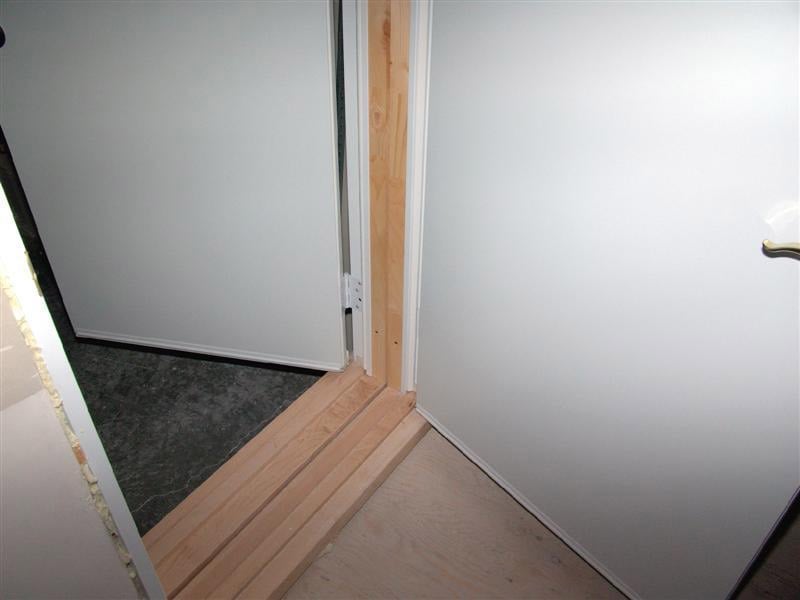
The double door system is the best way of soundproofing a room, but it may only be possible to pull off if you own your apartment.
You can go one step further with sound prevention by sealing the doorways with weather strips and attaching door sweeps to the bottom of the doors.
Build a room within a room
Creating a room within a room is key to full-on soundproofing. In an apartment setting, you can do this by setting up drywall as an inner wall and placing some sort of insulation material in between the drywall and the main wall.
I’m the worst handyman on planet earth, so this isn’t something I would try to build myself. If you’re anything like me, I’d suggest hiring a professional to do it for you. If you can pull it off, having a room within a room will be the best thing to stop your drum noise from traveling through the building. At the very least, having inner walls will stop the sound from being as intense for the neighbors on either side of you.
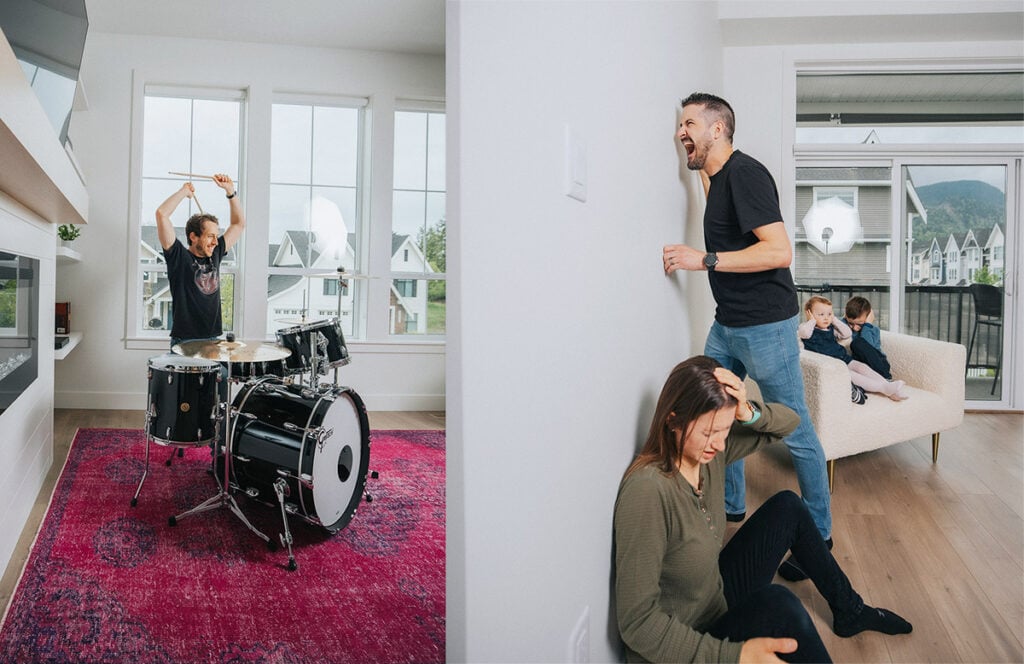
Even with all the muffling, insulating, and soundproofing, your apartment neighbors may still think you’re the most irritating person in the building.
I’ve always found it incredibly valuable to be open with the people around me. Talking to your neighbors about your passion and need to drum at home can go a long way.
Try getting them to understand what your goals are, why you love drumming, and what it means to you. They may end up supporting you. I’ve had neighbors attend my gigs before because they felt like they were with me on my drumming journey after hearing all of my practicing.
If you offer them an opportunity to play your drums themselves, they may be even more open to letting you play. It’ll be a fun activity for them, and they’ll understand what you’re doing a bit more.
There’s nothing more frustrating than not knowing when a loud noise is going to stop. Establishing a set practice schedule with your apartment neighbors could be the answer to getting them all on your side. If they know the exact hours that you’re going to play, they’re less likely to complain as they can plan their activities around them.
You can also find out when your neighbors aren’t around. That’s typically the best time to practice.
Keep on drumming…respectfully
At the end of the day, drums are loud instruments that are often met with resistance from the people around you. As drummers, we need to make the best of what we have to continue practicing – especially if you don’t have a recording studio or basement.
In some apartment complexes, your neighbors might be fine with you playing your acoustic kit at full volume within a certain time window. In other complexes, it means you’ll have to use an electronic kit as acoustic drums are simply too loud for the area, even with soundproofing.
Do everything you can to cut back on the noise and keep your neighbors happy. This way, you can keep doing what you love.
*This article contains affiliate links, which means we might earn a small commission from the product seller if you make a purchase. For more info, check out our privacy page.
Brett Clur Brett Clur is a drum teacher and has been playing drums for over 20 years. He's passionate about explaining difficult drumming concepts in simple ways. When he's not playing or teaching the drums, he's writing about them. You can find his many videos (over 700) on his YouTube channel or follow him on Instagram.


By signing up you’ll also receive our ongoing free lessons and special offers. Don’t worry, we value your privacy and you can unsubscribe at any time.
We use cookies for traffic data and advertising. Cookie Policy »